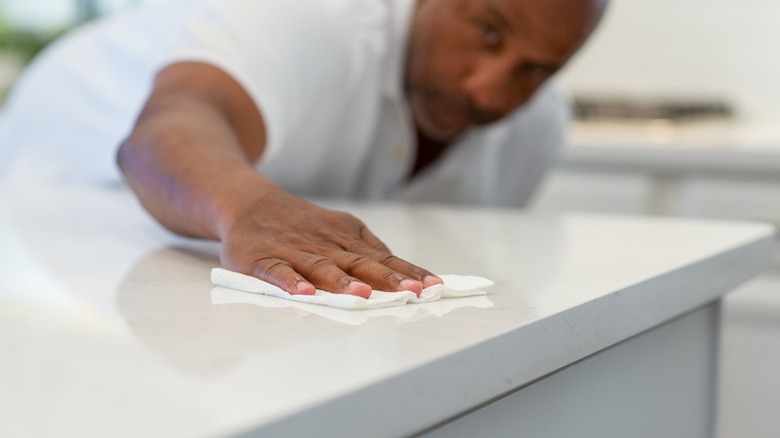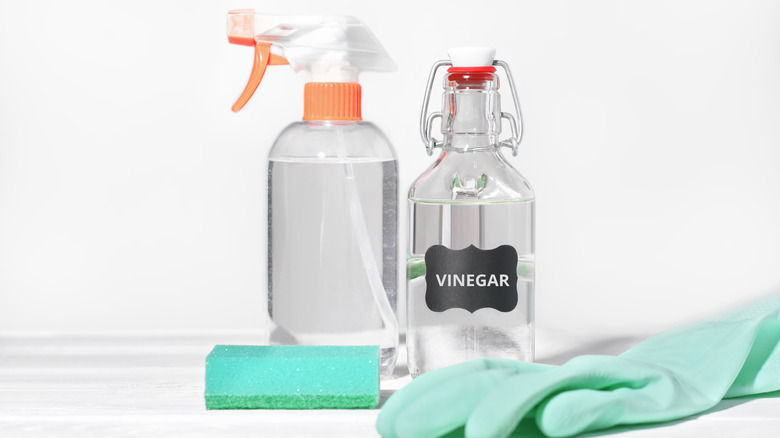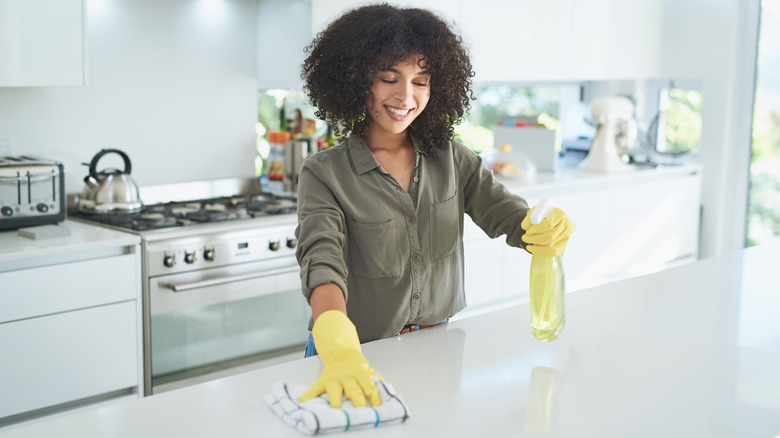Is It A Good Idea To Use Vinegar To Clean Quartz Countertops?
Quartz countertops can be a beautiful and elegant addition to your kitchen or bathroom that also boast quite a few benefits over natural stones like granite and marble. Aside from often being more affordable, quartz countertops are generally easier to maintain and clean than natural stones due to their non-porous nature. Unlike granite and marble, which are porous and can absorb liquids, quartz is engineered to be resistant to stains. This dense surface makes quartz countertops less prone to harboring bacteria or mold and allows for easier cleanup of spills and messes. Additionally, quartz countertops do not require sealing, which is often necessary for granite and marble to protect against stains and damage. Perhaps most importantly, this is one of quartz's best features, as its ease of cleaning also means many non-abrasive household cleaning products are safe to use, including a simple vinegar solution.
It's generally safe to use vinegar to clean quartz countertops because vinegar is a mild acid and quartz is a durable, watertight material. When diluted with water, vinegar becomes even gentler, reducing the risk of causing damage to the quartz surface. The mild acidity of vinegar effectively breaks down grease, grime, and stains without leaving behind residue or harming the countertop's finish. However, it's important to avoid using undiluted vinegar or harsh cleaners, as these can potentially etch or dull the quartz surface over time. Overall, when used appropriately, vinegar provides an effective and safe cleaning solution for maintaining the beauty and cleanliness of quartz countertops.
How to use vinegar to clean quartz countertops
To effectively clean your quartz countertops using vinegar, it's important to follow a few simple steps. First, gather the necessary materials: white vinegar, water, a spray bottle, a microfiber cloth or soft sponge, and dish soap (optional). Begin by diluting the vinegar with water in a 1:1 ratio to prevent any potential damage to the quartz surface. Vinegar's acidic nature can break down grime and disinfect surfaces without leaving streaks or residue.
Next, spray the diluted vinegar solution onto the countertop, ensuring even coverage across the surface. Let the solution sit for a few minutes to penetrate and loosen any dirt or stains. Avoid using abrasive scrub brushes or scouring pads, as these can scratch the quartz. After letting the vinegar solution work its magic, gently wipe down the area with a microfiber cloth or soft sponge. Use circular motions to lift away any remaining dirt or stains. For stubborn spots, you can add a drop of dish soap to the cloth or sponge to help break down grease and grime.
Once you've thoroughly cleaned the countertop, rinse the surface with water to remove any vinegar residue. Be sure to dry the counter completely with a clean towel to prevent water spots or streaks from forming. It's essential to avoid using harsh chemicals or cleaners containing bleach, ammonia, or abrasive agents, as these can damage the quartz and affect its appearance over time.
Precautions for cleaning quartz
When using vinegar to clean your countertops, or when cleaning quartz in general, it's a good idea to proceed with caution to avoid potential damage. While vinegar is effective for many cleaning tasks due to its acidic properties, quartz is sensitive to certain acids, including vinegar, which can cause etching or dulling of the surface over time. Always dilute vinegar before using it on quartz countertops, as this dilution helps reduce the acidity while still retaining vinegar's cleaning effectiveness.
Another caution is to avoid using physically coarse cleaners, scrub brushes, or scouring pads on quartz countertops. These harsh materials can scratch the surface, leaving behind permanent damage. Instead, opt for soft cloths, microfiber towels, or non-abrasive sponges to gently clean the countertop. It's also important to promptly clean up spills on quartz countertops, especially acidic substances like lemon juice, wine, or tomato sauce. Leaving these materials on the surface for an extended period can cause etching or staining. Immediately wipe up spills with a damp cloth and mild dish soap to prevent damage.
Finally, quartz countertops should not be exposed to extreme heat. Placing hot pots, pans, or appliances directly onto the quartz surface can cause thermal shock, leading to cracks or discoloration. Always use trivets or pads to protect the countertop from heat damage.


